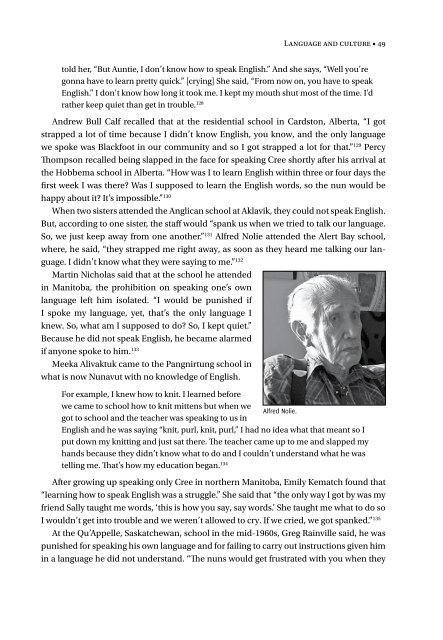The Survivors Speak
1MB8J05
1MB8J05
You also want an ePaper? Increase the reach of your titles
YUMPU automatically turns print PDFs into web optimized ePapers that Google loves.
Language and culture • 49<br />
told her, “But Auntie, I don’t know how to speak English.” And she says, “Well you’re<br />
gonna have to learn pretty quick.” [crying] She said, “From now on, you have to speak<br />
English.” I don’t know how long it took me. I kept my mouth shut most of the time. I’d<br />
rather keep quiet than get in trouble. 128<br />
Andrew Bull Calf recalled that at the residential school in Cardston, Alberta, “I got<br />
strapped a lot of time because I didn’t know English, you know, and the only language<br />
we spoke was Blackfoot in our community and so I got strapped a lot for that.” 129 Percy<br />
Thompson recalled being slapped in the face for speaking Cree shortly after his arrival at<br />
the Hobbema school in Alberta. “How was I to learn English within three or four days the<br />
first week I was there? Was I supposed to learn the English words, so the nun would be<br />
happy about it? It’s impossible.” 130<br />
When two sisters attended the Anglican school at Aklavik, they could not speak English.<br />
But, according to one sister, the staff would “spank us when we tried to talk our language.<br />
So, we just keep away from one another.” 131 Alfred Nolie attended the Alert Bay school,<br />
where, he said, “they strapped me right away, as soon as they heard me talking our language.<br />
I didn’t know what they were saying to me.” 132<br />
Martin Nicholas said that at the school he attended<br />
in Manitoba, the prohibition on speaking one’s own<br />
language left him isolated. “I would be punished if<br />
I spoke my language, yet, that’s the only language I<br />
knew. So, what am I supposed to do? So, I kept quiet.”<br />
Because he did not speak English, he became alarmed<br />
if anyone spoke to him. 133<br />
Meeka Alivaktuk came to the Pangnirtung school in<br />
what is now Nunavut with no knowledge of English.<br />
For example, I knew how to knit. I learned before<br />
we came to school how to knit mittens but when we<br />
Alfred Nolie.<br />
got to school and the teacher was speaking to us in<br />
English and he was saying “knit, purl, knit, purl,” I had no idea what that meant so I<br />
put down my knitting and just sat there. <strong>The</strong> teacher came up to me and slapped my<br />
hands because they didn’t know what to do and I couldn’t understand what he was<br />
telling me. That’s how my education began. 134<br />
After growing up speaking only Cree in northern Manitoba, Emily Kematch found that<br />
“learning how to speak English was a struggle.” She said that “the only way I got by was my<br />
friend Sally taught me words, ‘this is how you say, say words.’ She taught me what to do so<br />
I wouldn’t get into trouble and we weren’t allowed to cry. If we cried, we got spanked.” 135<br />
At the Qu’Appelle, Saskatchewan, school in the mid-1960s, Greg Rainville said, he was<br />
punished for speaking his own language and for failing to carry out instructions given him<br />
in a language he did not understand. “<strong>The</strong> nuns would get frustrated with you when they


